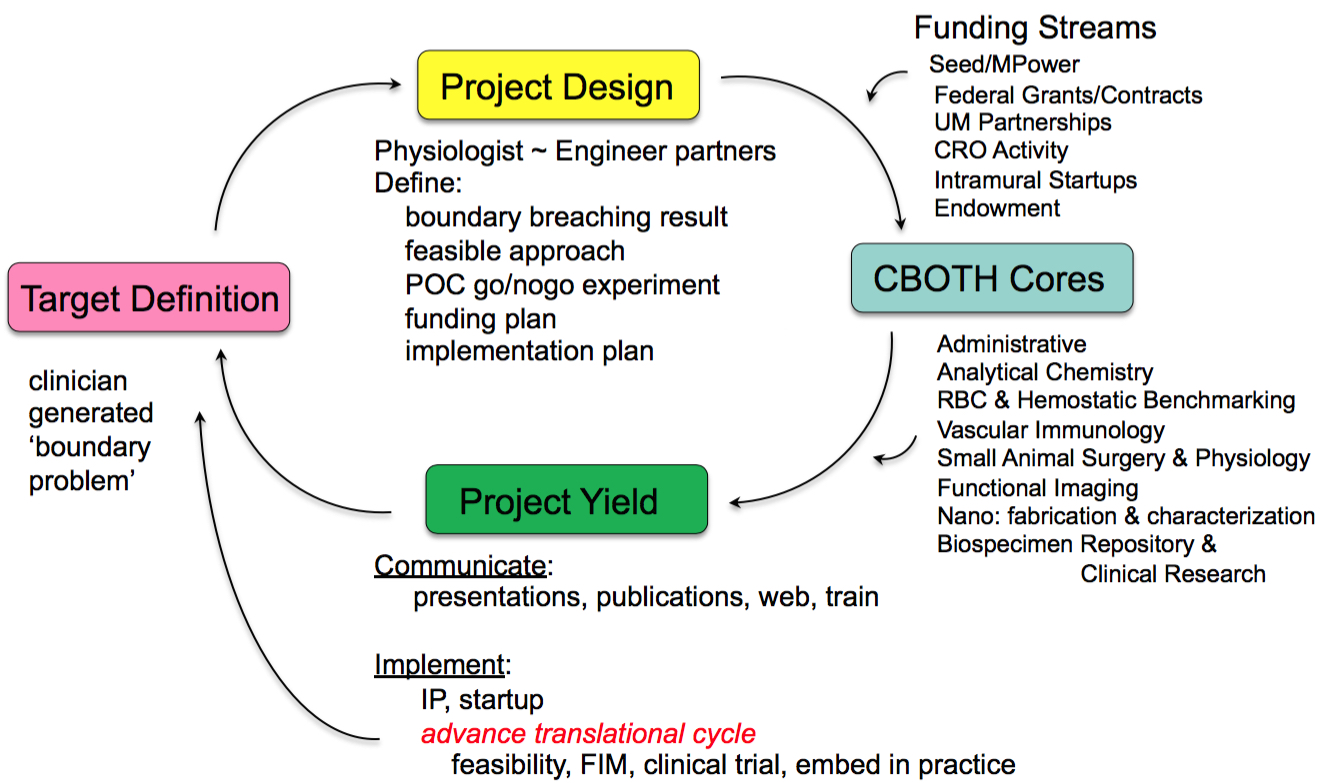Oxygen (O2) transport and hemostasis are central to human adaptation to stress/injury and to disease pathobiology
The interdisciplinary Center for Blood Oxygen Transport & Hemostasis (CBOTH) addresses fundamental, challenging questions related to blood O2 transport and hemostasis from a systems perspective, with attention to human biology, physiology and therapeutics.
Innovative study of O2 transport, hemostasis and key interacting biologic systems crosses traditional disciplines; moreover, efficient therapeutic development bridges typical stages of pharmaceutical & bioengineering advancement.
CBOTH surmounts this challenge by integrating effort from leading investigators across disciplines and engagement across the translational pipeline.
Through these interdisciplinary efforts, CBOTH will advance the development of an artificial blood product for use in trauma settings without easy access to donated blood for transfusions, such as battlefields or rural areas.
CBOTH includes a team of physicians, biochemists and engineers who are working to answer fundamental, challenging questions related to blood function in the setting of critical illness.
Developing novel technologies that emerge from Center laboratories, including:
- Effect of disease, stress and trauma on RBC biology and O2 delivery
- Effect of RBC injury on O2 delivery homeostasis
- RBC interaction and influence on hemostatic and immune systems
- Optimization of blood product preparation and transfusion to improve O2 transport and hemostasis
- Pre-clinical models and clinical trials to test engineered “biomimetic” blood components that optimize O2 transport and hemostasis
In partnership with the UMB BioPark, CBOTH hosts startups, developing novel technologies that emerge from Center laboratories. KaloCyte is the first such startup at CBOTH, developing the ErythroMer artificial red blood cell design into a pragmatic therapeutic.
Hosting core facilities to provide CRO-like resources
In addition to basic and translational science programs, CBOTH hosts core facilities to provide CRO-like resources in the areas of:
- RBC biology, physiology and biochemistry
- Nano-engineering based therapeutic development
- Pre-clinical models and Clinical Trials for evaluation of O2 transport physiology and transfusion medicine
Allan Doctor, MD: Pediatrics and Bioengineering
Allan Doctor, MD, is a Professor of Pediatrics and Bioengineering at the University of Maryland School of Medicine (UMSOM). He is a Pediatric Intensivist and previously led Pediatric Critical Care at Washington University and St Louis Children’s Hospital for 10 years, before transitioning to UMSOM to focus on a rapidly expanding research program and on development of a novel bio-synthetic artificial red cell (ErythroMer).
Dr. Doctor is a co-Founder and Chief Scientific officer for KaloCyte, which is developing ErythroMer for commercial use. His laboratory studies the role of red blood cell-based signaling in the control of regional blood flow, related pathophysiology arising from acquired red cell injuries, blood substitute design, and on translational transfusion medicine in critical illness.
Dr. Doctor has led two translational research networks
BloodNet, an international group that pursues questions common to Transfusion & Critical Care Medicine, and the NIH/NICHD Collaborative Pediatric Critical Care Research Network are his two research networks.
Currently, he directs the University of Maryland Center for Blood Oxygen Transport and Hemostasis (CBOTH), which addresses fundamental, challenging questions related to blood O2 transport and hemostasis, from a systems perspective.
He gives attention to human biology, physiology and therapeutics and is the Principle Investigator for CONCERT: the US DoD/DARPA funded Consortium for Optimized Integration of Bio-artificial Blood Components for Adaptive Resuscitation.



